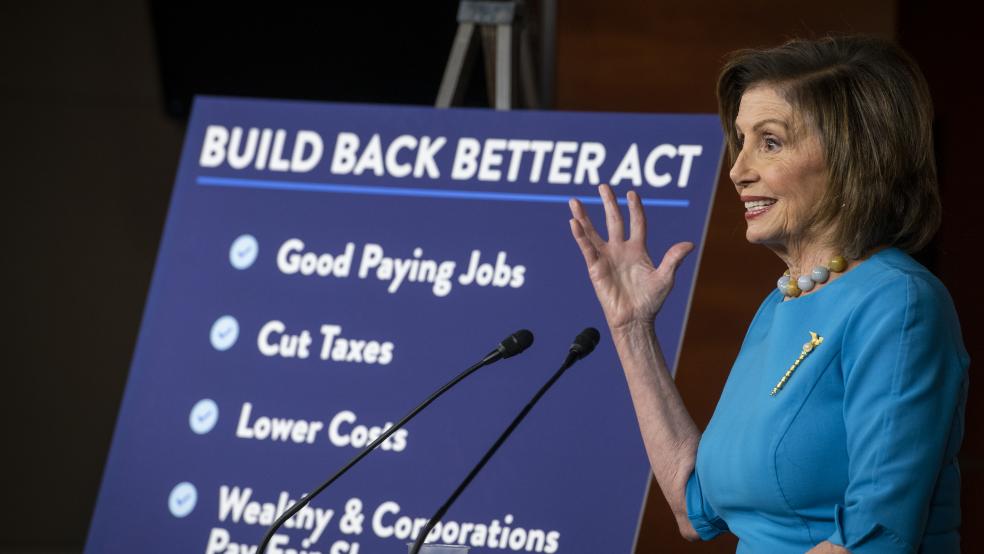The Congressional Budget Office on Thursday estimated that, despite promises from President Joe Biden and others in his party that their Build Back Better plan would be fully paid for, the legislation would add about $160 billion to budget deficits over the next 10 years — with a $750 billion gap in the first five years, a result of the front-loaded nature of the spending plans that Democrats made temporary to keep costs low.
The budget scorekeeper said that the plan would actually increase deficits by $367 billion through 2031, but that was “not counting any additional revenue that may be generated by additional funding for tax enforcement.” CBO projected that those additional revenues from beefing up the Internal Revenue Service would total $207 billion over 10 years — far less than the $480 billion the White House had projected — bringing the overall deficit impact to $160 billion.
The new numbers appeared unlikely to derail House Democrats’ plans to approve the bill in a vote Thursday evening. Party leaders expressed optimism throughout the day that they’ll be able to pass what would be the largest expansion of the nation’s safety net in decades — even as they waited for the CBO cost estimate. “At the close of the debate, all that remains is to take up the vote – so that we can pass this legislation and achieve President Biden’s vision to Build Back Better!” House Speaker Nancy Pelosi (D-CA) said in a letter to colleagues Thursday afternoon.
Treasury Secretary Janet Yellen said in a statement Thursday evening that, when factoring in her department’s analysis of the proposed IRS investments, the legislation “is fully paid for, and in fact will reduce our nation’s debt over time by generating more than $2 trillion through reforms that ask the wealthiest Americans and large corporations to pay their fair share.”
Using the Biden administration’s projection for revenue from the IRS plan would result in a roughly $113 billion reduction in deficits over the next decade.
Budget hawks disagree, though, arguing that the CBO analysis means that Democrats should find $160 billion in cuts or revenue. “They should also drop the arbitrary sunsets and gimmicky SALT-related offsets. At an absolute minimum, they should make a credible commitment not to extend any parts of the bill without paying for them as well,” said Maya MacGuineas, president of the Committee for a Responsible Federal Budget, which has found that making the temporary parts of the bill permanent would about double its cost, potentially adding $3 trillion to deficits.
A Battle Over Boosting the IRS
The new CBO analysis projects that the Democrats’ plan to invest $80 billion over 10 years in beefing up the Internal Revenue Service and boosting the agency’s tax enforcement would generate $207 billion in increased revenues, decreasing deficits by a net $127 billion through 2031.
As expected, that’s far less than the $480 billion in revenues — and net $400 billion — that the Biden administration has projected. But the White House has challenged the budget office’s methodology for estimating the effects of beefed-up IRS enforcement, arguing that its own projections are more accurate and pointing to other experts who predict even greater returns.
The dispute, as Politico’s Brian Faler writes, “largely boils down to a single question: How afraid will rich people be of a newly empowered tax collector? … It’s an inherently tough topic because it means predicting how wealthy people and corporations will perceive the IRS in the future.”
The administration has projected that the $400 billion in additional revenue would include $240 billion expected to flow to the Treasury from increased audits of corporations and the rich and another $160 billion that could result from greater compliance as people adjust their behavior in response to the IRS’s new muscle.
The Congressional Budget Office projects far less fear, and thus far less revenue over time, than Treasury officials do. “There’s other analyses that put a lot of weight on the idea of deterrence — that if people know that the IRS is doing more and auditing more that other people then pay more of their taxes,” CBO director Phillip Swagel said this week. “The research literature on deterrence, I’d say, is very mixed.”
CBO also says that corporations and the wealthy, in particular — the very crowd Democrats are targeting — will not be deterred from trying to avoid taxes.
The White House has gotten support for its position from some economists and tax experts, including former Treasury secretary Larry Summers, who has been critical of the Biden administration on other aspects of economic policy, most notably inflation. In a Washington Post op-ed Thursday, Summers backs the administration's view that the IRS plan would generate more revenue than CBO projects — and he argues that Treasury’s estimates are likely too conservative as well, pointing to research on the tax gap that he and others have done.
Summers says that the White House’s $400 billion revenue estimate represents just 5.7% of the tax gap — the difference between what is owed and what gets collected — over the next 10 years. “That modest gain is a more-than-reasonable expectation given the starting point,” he writes. “In general, I believe policy should be set on the basis of official scorekeeping by nonpartisan scorekeepers. But, in this case, it would be irresponsible to not recognize that the CBO estimate for tax-compliance efforts is conservative to the point of implausibility.” (Read Summers’s full piece here.)
The bottom line: House Democrats can only afford to lose three votes as they try to pass the Build Back Better Act — and even if they succeed tonight, the legislation still faces an uncertain fate in the Senate, where Joe Manchin (D-WV) or other lawmakers may insist on substantial changes.




